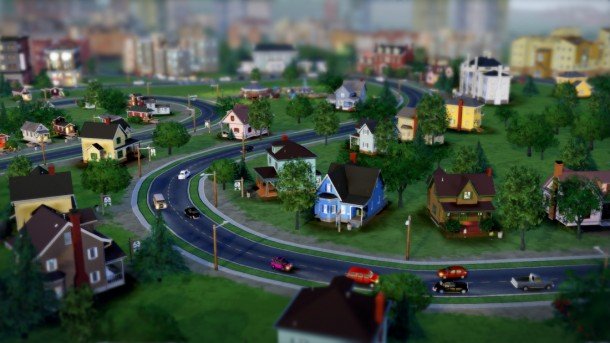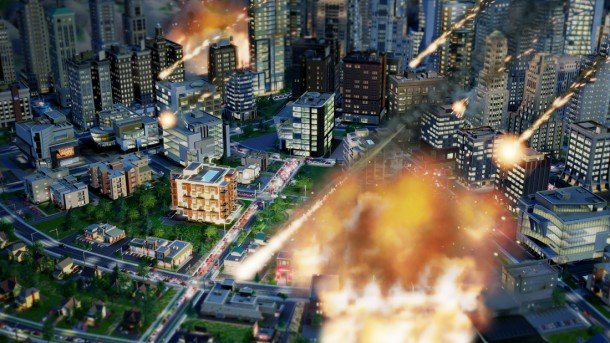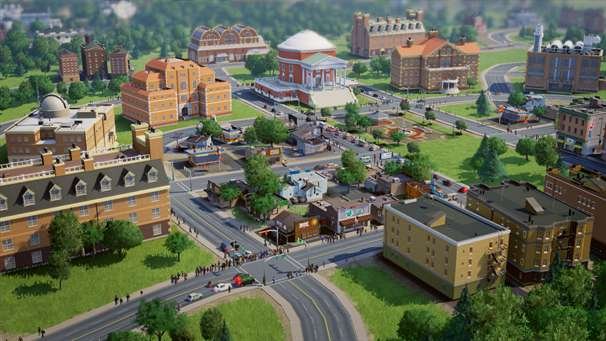SimCity interview: failure states, casinos, Minecraft, and the working class

Among all the remakes, sequels, and spiritual reboots behind us in 2012 and ahead of us in 2013, SimCity's seems to stand out. I think it's because in order to rework SimCity—and do so authentically—you can't simply rewrite a lead character to make them more edgy, or add multiplayer, or append a few new features. You have to fundamentally rethink the way city builders should operate in the decade to come, and what people want in them.
I've been encouraged by SimCity's direction so far. With Glassbox , Maxis seems to have a tool that lets the art do much more of the heavy lifting in terms of expressing feedback, while stowing the numbery details beneath the skin of the game for data-minded mayors. It's an always-online game, but the collaborative nature of its multiplayer seems like the primary way I'll want to play. To get a better sense of how the project is going, I spoke with Lead Designer Stone Librande.

PCG: Do you think Minecraft has renewed interest in building as an activity in games?
Stone Librande: Yeah, definitely. A lot of our kids here in the office are hooked on Minecraft. They play it all the time. We even had a server here for quite a while that a lot of us were playing on. We totally love that spirit of game. The Maxis mission, kind of, is creative play. Any game that proves that there's people out there who just love creativity and aren't as much into "Game over" or "I won"... It's more about, "I would like to experiment. I'd like to see what happens if..." We're really strongly in that ballpark of, "Here's a bunch of stuff. Put it together and see what you can do with it."
SimCity will have a global market that sets shared prices for commodities. How malleable or open to manipulation or catastrophe will the world market be? Can the price of oil crash and create a shortage?
Librande: Yes and no. We didn't want to make an EVE system or a World of Warcraft auction system where the players have control of the prices in that way. Those economies tend to spiral out of control over time, since money is an infinite resource. You just start a new city and start making new money. The way the global market is set up, we have bounds on the high and low prices. We won't allow the price to go outside those bounds. There's a little bit of price-fixing on that side to keep the game playable. Then we tuned a lot of the commodities so if the price maxes out, you probably don't want to be working with those resources.
Here's a specific example: I'm drilling oil out of the ground and converting it into fuel. The more fuel I sell, it's going to start to lower the price on the global market. But my single contribution to that lowering is a fraction of a percent. If everybody on the server starts dumping fuel and nobody's selling oil, then you'll start to see the price of fuel drop down and the price of oil rises up. The idea is that encourages people to say, "Well, I'll just start selling the oil and get out of fuel now." Then that causes the opposite thing to happen. From a design point of view, the idea is that we didn't just want someone to write a guide, like, "Here's the FAQ. You should always make this and sell that." If anybody thinks they've found a flaw like that in the game and says, "You should do this!" and everyone starts following them, that actually changes the whole price structure. That invalidates that technique while something gets boosted on the other end.
Keep up to date with the most important stories and the best deals, as picked by the PC Gamer team.
Has the unique opportunity to design a virtual commodities market made you wish that there was a certain way the world worked?
Librande: That's a tricky one. Most of my economics experience comes from playing video games, not from reading books or going to lectures. I wouldn't consider myself an expert on the world economy at all, or even trying to model that. We're really just trying to make a system that we felt would give us the most gameplay. As a designer, I'm really... I try not to make games where there's a right solution that lets you win every time. That's my main goal. Not to try to simulate a real-world economy.
That said, at a base level, this is a supply and demand kind of thing. I think we'll get a lot of interesting player psychology coming from it. Should you buy? Should you sell? You want to buy low and you want to sell high, so you're going to be making guesses about the best time to do that. The idea is, if you're always ahead of the crowd, you'll make money. If you're following the crowd, you'll be behind the curve and you'll lose money. Good predictions will help in that sense. But we really need to go through our beta test, with thousands of users, to get enough statistical richness to really run these systems through their paces.

With torture being a time-honored theme of The Sims as a series, I'm curious if Maxis or EA or any of your testers have stumbled on any especially effective techniques for messing with Sims.
Librande: Yeah. There's a lot of little things you can do. In our game, the Sims are at such a small level that you can't actually see their agonized faces. Not like you can in The Sims. So there's a bit of a disconnect there. But how we like to talk about it is... it's less like torture in The Sims, and more like messing with an anthill. If you're a kid and you start digging in an anthill or dumping sugar on it. You get that effect. Some of the things you can do: You can break the roads and everyone will just drive around in circles forever without anywhere to go. You can watch a trail of them in this endless loop going around.
"You can say, 'I'm gonna put the richest people at the bottom of this hill,' and then at the top of the hill goes the sewage treatment plant."
Because of the way the simulation is set up, depending on your mood, you can say, "I'm gonna put the richest people at the bottom of this hill," and then at the top of the hill goes the sewage treatment plant. It's just dumping raw sewage down the side of the hill into the rich zone. Eventually they'll get disgusted and leave, but not before they get sick. You can play little games like that. It mostly comes down to their health in that case. It sends them to the hospital. You can always bulldoze their houses and dump them out. There is one little consequence if you bulldoze some houses in the low wealth areas. They won't have enough money to move elsewhere, and there's a chance they'll become homeless. Then as the homeless move around your city, they're harder to get rid of. You can create these problems that are trickier to deal with, so you have to be careful.
What events will actually kill your citizens?
Librande: Some of it's just going to be player storytelling. You could tell yourself the story of, "Oh, all those people died," or you can say, "They all moved out of town." The game doesn't really put up a big sign with a skull and crossbones on it saying "This many people died when you bulldozed that building." But you don't see them all driving away, either. If you destroy a skyscraper with several hundred people in it, you don't see this mass exodus of several hundred people. So you can tell the story like, "I'm the mean mayor, I killed them all," or you can tell the story like, "I evicted them all and they left." The specific death events are the sickness system... We'll call those injuries. When an injury happens, the person who got injured will die if an ambulance doesn't pick them up in a certain amount of time. You can't really directly control the injuries. You can't force an injury to happen. But they tend to happen a lot more in industrial areas. Factories will tend to have a lot more injuries than commercial. You can make cities that have a higher injury rate, and that's an actual, real death. Those do get tracked.
You probably think I'm a terrible person now.
Librande: No, we've talked about all this over and over. We're very used to it.
What's your timing look like for the closed beta?
SimCity PR: Right now we're not really talking about that. I'll keep you in the loop when we have more details.
You guys are supporting Mac and PC cross-platform play, right?
Librande: Yes. The servers don't care how you connect. You could play your game on a Mac at home and then go to work and play on your PC, pick up the game where you left off.

Neat. Does SimCity have any true failure states? Game-over, dead-stop, your-city-is-irreparable kind of conditions?
Librande: There is one. I preface that by saying that we try to make none. The way the system is set up, zoning is free now, and unzoning is free too. You make money from the taxes on your zones. In the worst case, if you run completely out of money, you can turn off all of your government buildings. Even if you have one zone with one house, you would start making money again and get back in the black. That's the basic idea. You'll never lose. If you get down to zero dollars, it might be very painful to recover, but it's never game over.
"There's never really a case where you're forced to stop playing, where a screen comes up and says, 'GAME OVER, YOU HAVE LOST.'"
But then recently, when we started working on the loan system, we realized that there's one thing that could happen where you could have so much debt in loans that even turning off all your government couldn't let you recover from that debt. Then it would really be like, "I can't play this city anymore." Even in that case, because we're playing in a region, it's possible for you or a friend in that region to donate money from another city back into yours and provide the cash to get it back up and going again. So there's never really a case where you're forced to stop playing, where a screen comes up and says, "GAME OVER, YOU HAVE LOST." That'll never happen. But there are situations where you might just give up and say, "I'd rather start a new city than dig this one out of the hole."
Inversely, is the game designed to let players achieve a state of harmony with their city, where everything is in balance? Is that possible?
Librande: It depends on the player's personality. If you wanted to get into a state where it's just a screensaver running in the background, you could maybe do things like that. But there's always a chance that a fire or something will happen, and there's going to be consequences to that. For a lot of players, harmony is not a desirable goal. You get harmony and that inspires you to mess with something. "That works. Now let me add in the university!" And suddenly things get knocked out again. But the basic loop of the game, from the beginning stages up through the high-density buildings, is that when your city gets really happy, it grows. It grows in density. Every time that density growth happens, it puts pressure on your city. In a way, happiness causes growth, which causes pressure, which causes collapse. Then you work to get back to happiness, and once you're happy, it's time to grow again.
I'm interested in hearing about some of the more obscure, indirect dependencies between resources and systems. Does a water shortage affect the police? Can putting down a college somehow affect the power plant system? I might be reaching here, but I'm curious if there's anything obscure that you've either designed in or observed.
Librande: For sure with the power and the water. Almost anything you put down is going to affect those systems. Everything needs electricity. Almost everything needs water. Putting in any building at all is going to cause you to upgrade your power plants and your water system over time. If you run out of water, then the fire system will be the first to really feel that. It has a harder time, if not an impossible time, putting out fires if there's no water going to the buildings that are on fire. You're going to get all those crossover effects from that. The RCI [residential, commerce, industry] stuff will also just start to rebel and complain. The rich and the educated are the first people to complain. Then the lower-wealth and the uneducated, they don't complain as much. You start to get a crossover between, "Oh, if I turn off the power, the low-wealth people stick around much longer than the high-wealth people will."
“The rich and the educated are the first people to complain.”
Some of the bigger systems are the transportation systems, which will have a huge effect on your city's functionality. If you put light rail in, or a lot of bus stations, that'll help unclog the streets in big cities. People can get to work. If the streets are all jammed up, your city starts to not function very well generally. Nobody can shop or get to work.

Evan's a hardcore FPS enthusiast who joined PC Gamer in 2008. After an era spent publishing reviews, news, and cover features, he now oversees editorial operations for PC Gamer worldwide, including setting policy, training, and editing stories written by the wider team. His most-played FPSes are CS:GO, Team Fortress 2, Team Fortress Classic, Rainbow Six Siege, and Arma 2. His first multiplayer FPS was Quake 2, played on serial LAN in his uncle's basement, the ideal conditions for instilling a lifelong fondness for fragging. Evan also leads production of the PC Gaming Show, the annual E3 showcase event dedicated to PC gaming.

